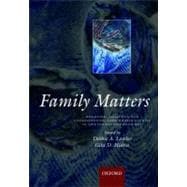
Note: Supplemental materials are not guaranteed with Rental or Used book purchases.
Purchase Benefits
What is included with this book?
| Preface | p. vii |
| Contributors | p. ix |
| Why family matters: an introduction | p. 1 |
| The theoretical underpinning for the use of family-based studies in life course epidemiology | |
| Theoretical underpinning for the use of intergenerational studies in life course epidemiology | p. 13 |
| Theoretical underpinning for the use of sibling studies in life course epidemiology | p. 39 |
| Theoretical underpinning for the use of twin studies in life course epidemiology | p. 57 |
| Discussant chapter-summary of the theoretical approaches to family-based studies in life course pidemiology | p. 85 |
| The practicalities of undertaking family-based studies | |
| Birth cohorts: a resource for life course studies | p. 99 |
| Family-based life course studies in low- and middle-income countries | p. 129 |
| Using available family members as proxies to provide information on other family members who are difficult to reach | p. 151 |
| Discussant chapter-the practicalities of undertaking family-based studies | p. 181 |
| Statistical methods in family-based studies | |
| Statistical considerations in intergenerational studies | p. 195 |
| Random effects models for sibling and twin-based studies in life course epidemiology | p. 229 |
| Discussant chapter-statistical considerations in family-based life course studies | p. 251 |
| Some illustrative examples of the use of family-based studies in life course epidemiology | |
| Family-based studies applied to the influence of early life factors on cardiovascular disease | p. 263 |
| How family-based studies have added to the understanding of life course epidemiology of mental health | p. 279 |
| How family-based studies have added to understanding the life course epidemiology of reproductive health | p. 295 |
| Discussant chapter-using family-based designs in life course epidemiology | p. 317 |
| The future of family-based studies in life course epidemiology: challenges and opportunities | p. 325 |
| Index | p. 335 |
| Table of Contents provided by Ingram. All Rights Reserved. |
The New copy of this book will include any supplemental materials advertised. Please check the title of the book to determine if it should include any access cards, study guides, lab manuals, CDs, etc.
The Used, Rental and eBook copies of this book are not guaranteed to include any supplemental materials. Typically, only the book itself is included. This is true even if the title states it includes any access cards, study guides, lab manuals, CDs, etc.